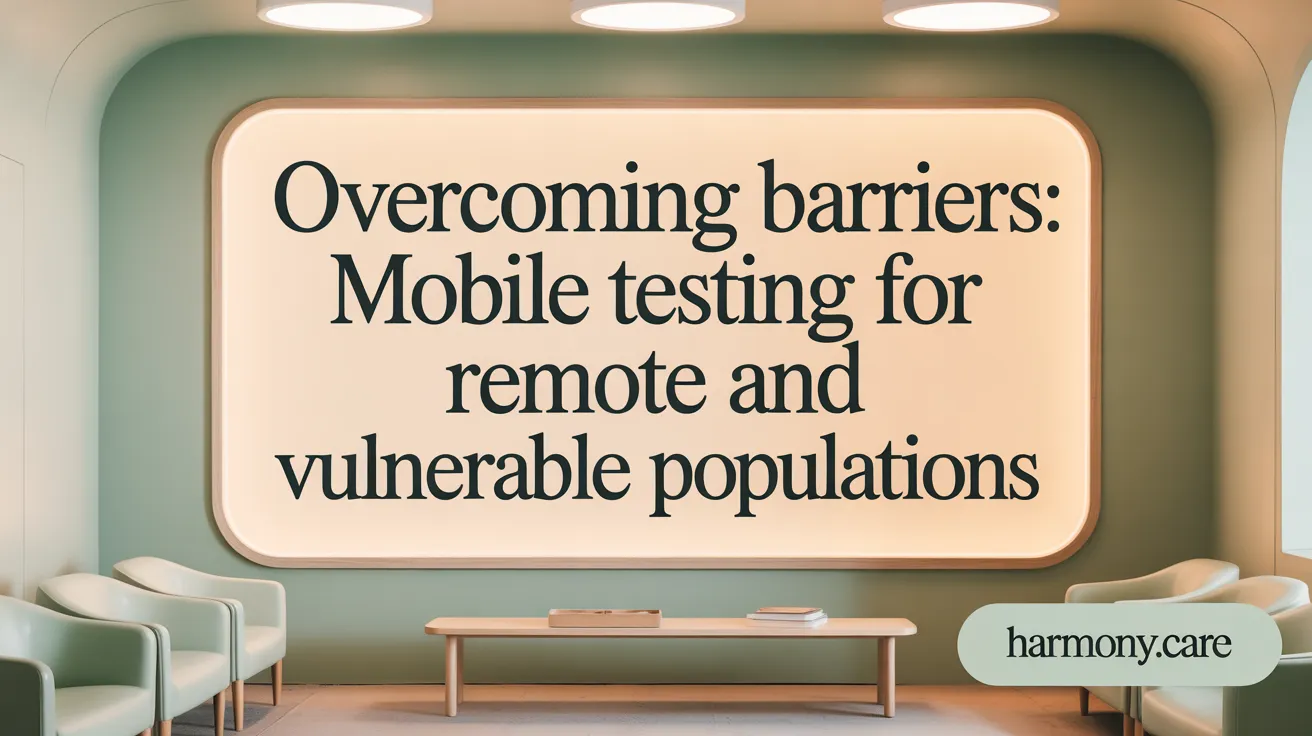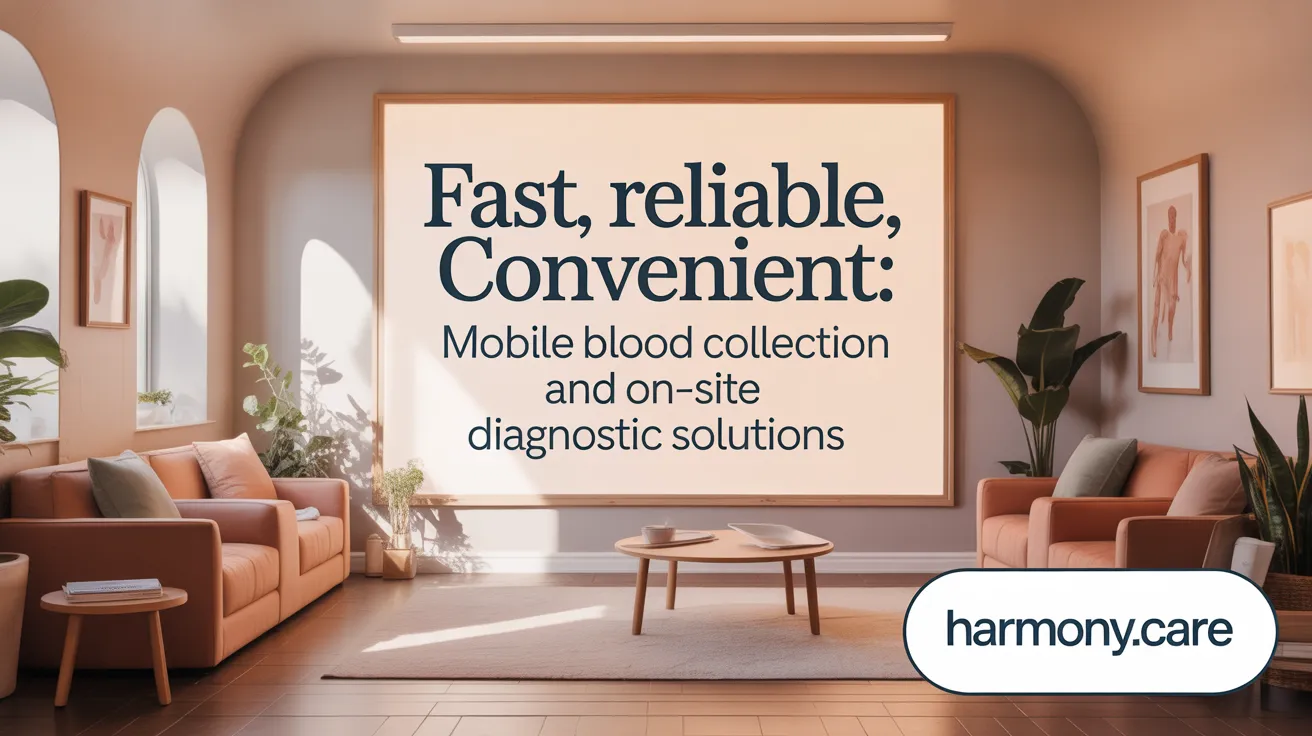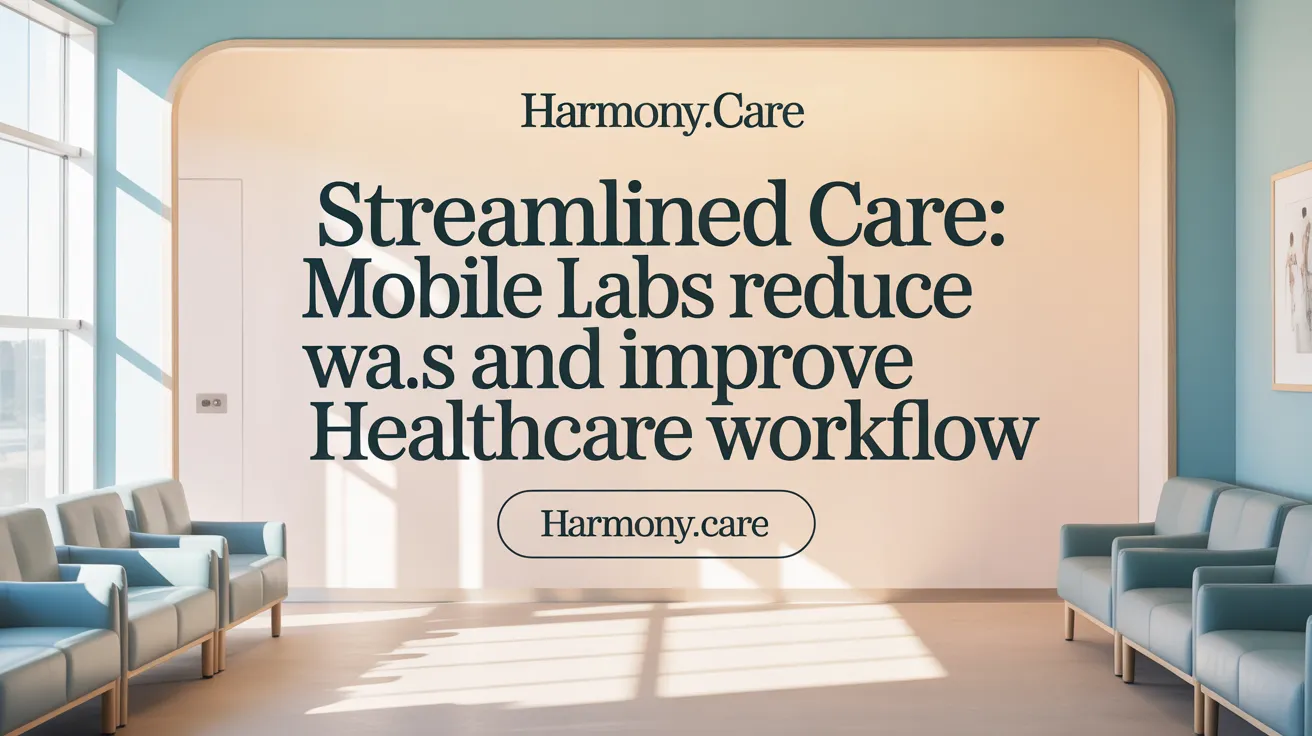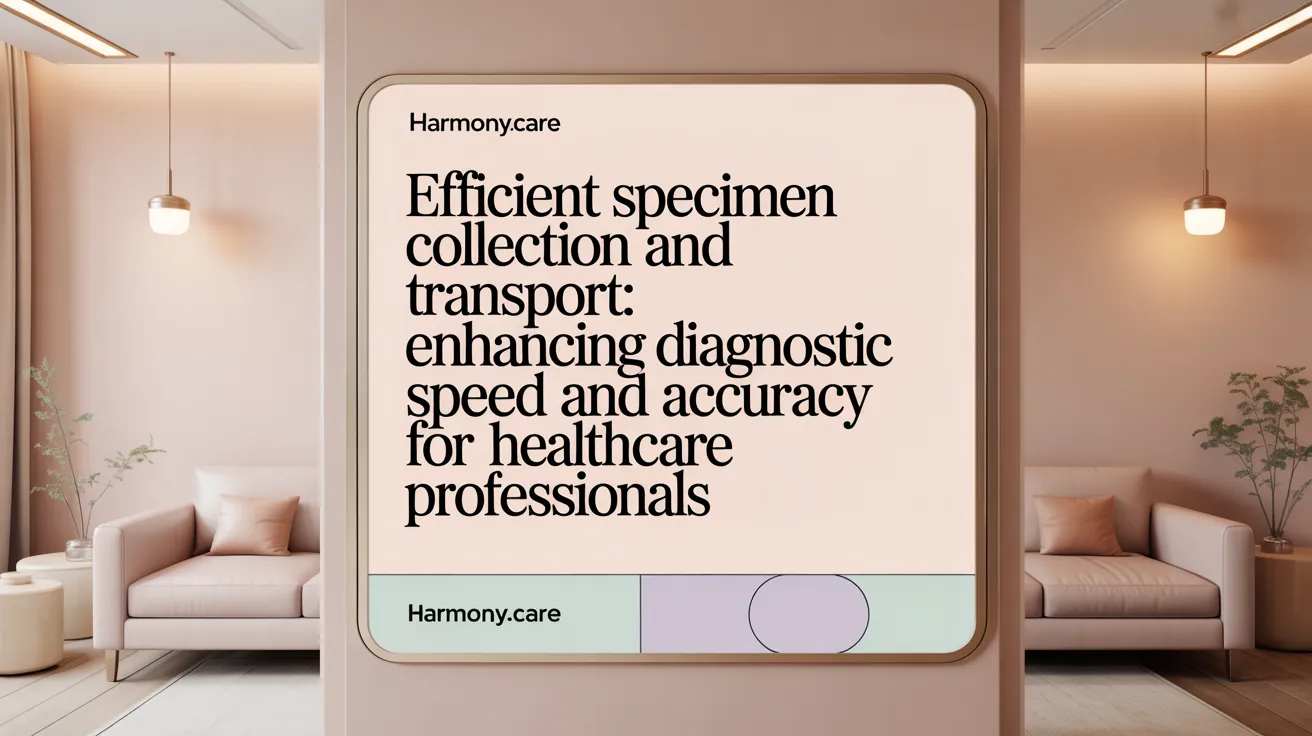The Critical Role of Mobile Lab Services in Modern Healthcare
Mobile lab services are rapidly reshaping healthcare delivery by minimizing delays inherent in traditional diagnostic processes. By bringing testing capabilities directly to patients—whether at home, in long-term care facilities, or remote locations—these services accelerate diagnosis and treatment, enhance patient experience, and streamline healthcare workflows. This narrative explores how mobile labs reduce delays in care, the operational mechanisms behind their success, and the broad benefits they offer to both patients and healthcare providers.
Expanding Accessibility and Breaking Logistical Barriers

What are the benefits of mobile lab testing in healthcare?
Mobile lab testing provides several advantages in the healthcare sector. It significantly increases access for people living in remote or underserved areas by eliminating the need for travel to distant laboratories or clinics. This convenience reduces wait times and logistical obstacles that often delay diagnosis and treatment.
By offering on-site or point-of-care testing, mobile labs enable faster results, helping healthcare providers make timely decisions. This quick turnaround can improve patient outcomes, especially in urgent or critical cases.
Patients tend to be more satisfied and compliant when tests are conducted in familiar surroundings, reducing their stress and anxiety. Mobile labs also support public health efforts by facilitating early detection and ongoing monitoring of infectious diseases and chronic conditions, which is essential for effective disease prevention.
Overall, mobile testing enhances healthcare efficiency by lowering costs, increasing reach, and fostering rapid response capabilities, all while ensuring broader and more equitable health service access.
Why are mobile lab services important for serving remote, homebound, or senior patients to ensure timely testing?
Mobile lab services are especially vital for vulnerable groups such as seniors, individuals with mobility challenges, or those living in remote locations. These services provide critical diagnostic testing right at patients’ homes, removing transportation barriers that might prevent timely care.
This in-home service allows for quick collection and processing of samples, reducing delays that could compromise health monitoring and treatment. For instance, during outbreaks of infectious diseases like Ebola or Dengue, mobile labs can rapidly deploy on-site testing, aiding immediate response efforts.
Mobile labs also play a key role in research, helping to evaluate vaccines and treatments in underserved areas and ensuring that data collection is swift and comprehensive. Advanced molecular diagnostics integrated into mobile operations further enhance disease surveillance.
By bridging healthcare gaps, these services promote health equity, ensuring vulnerable populations receive prompt diagnosis and ongoing care, ultimately improving health outcomes and supporting effective public health management.
Accelerating Diagnosis through Mobile Phlebotomy and On-Site Testing

What is the role of mobile phlebotomy and on-site testing in expediting diagnosis and treatment?
Mobile phlebotomy and on-site testing play a vital role in speeding up the diagnosis and treatment process by bringing laboratory services directly to where patients are. Instead of waiting for appointment slots at healthcare facilities, these services eliminate delays related to scheduling, transportation, and waiting in clinics or hospitals.
This approach makes testing more accessible, especially for vulnerable groups like seniors, immunocompromised individuals, or those with mobility issues. It significantly improves patient compliance, with studies indicating a 90% adherence rate for at-home blood testing. Such high compliance is essential for early detection of health conditions and preventing serious complications, which cost the U.S. healthcare system an estimated $100 billion annually.
During public health crises, like the COVID-19 pandemic, mobile services reduce exposure risks by minimizing patient visits to crowded healthcare facilities. This not only safeguards vulnerable populations but also ensures that necessary tests are completed without delay.
In addition to convenience, on-site diagnostic testing delivers rapid results, significantly reducing turnaround times. Faster test results facilitate earlier clinical decisions, enabling timely interventions that can improve patient outcomes.
Overall, integrating mobile phlebotomy and on-site testing enhances healthcare system efficiency, supports patient-centered care, and leads to better health results by making diagnostics more timely and accessible for everyone.
Enhancing Workflow Efficiency and Reducing Patient Wait Times

How do mobile labs improve workflow efficiency and reduce patient wait times?
Mobile labs significantly boost healthcare workflow efficiency by bringing specimen collection and testing directly into the patient’s environment. Instead of waiting for samples to be transported to external laboratories, on-site testing allows for faster processing and quicker results.
Integration of technology such as Laboratory Information Systems (LIS) and specimen tracking apps plays a crucial role. These systems automate labeling, monitor sample status in real-time, and reduce human errors during collection and transport. Barcode scanning and electronic tracking ensure samples are correctly identified and swiftly moved through different stages of testing.
The use of organized mobile workstations streamlines requisition processes. Staff can handle multiple patients more efficiently, managing schedules and documentation smoothly.
Speeding up turnaround times for diagnostic results benefits both providers and patients. Faster results lead to shorter wait times, enabling quicker clinical decisions and interventions.
Furthermore, mobile phlebotomy services improve patient satisfaction. By minimizing waiting periods and error rates, these services support more responsive and reliable healthcare delivery.
Overall, technological advances and process optimization through mobile testing create a more efficient healthcare environment, reducing delays and enhancing overall care quality.
Operational Advantages: Specimen Collection and Transport Innovations

What are the operational benefits of mobile lab services related to specimen collection and transport efficiency?
Mobile lab services greatly improve the process of collecting and transporting specimens by bringing laboratory capabilities directly to the patient’s location. This onsite approach enables diagnostic testing—such as RT-PCR and antibody tests—to be completed within approximately three hours, reducing the delays typically seen with traditional transportation methods.
Since mobile labs operate independently, they can perform immediate sample analysis, minimizing the risk of sample degradation during transport. This leads to more accurate results and faster diagnosis, which is vital during infectious outbreaks or urgent medical situations.
The ability to conduct testing on-site allows clinics and health agencies to respond quickly to emerging health threats. Swift testing supports not only individual patient management but also enhances public health activities like contact tracing and community testing.
Mobile labs are also instrumental in supporting real-time genomic sequencing and disease surveillance efforts, which are essential for tracking pathogen mutations and understanding transmission patterns.
Overall, these innovations in specimen collection and transport help healthcare providers to streamline workflows, decrease turnaround times, and strengthen outbreak readiness. As a result, comprehensive diagnostic and monitoring capabilities are maintained in diverse settings, improving overall efficiency and patient outcomes.
Leveraging Real-Time Analysis and Point-of-Care Diagnostics
How does real-time analysis and point-of-care diagnostics minimize delays in healthcare?
Real-time analysis and point-of-care testing (POCT) play a crucial role in cutting down waiting times for patients and healthcare providers. These diagnostic tools process tests directly at or close to the patient location, often providing results within minutes rather than hours or days. This rapid turnaround enables immediate clinical decisions, which is especially vital in emergencies and critical care scenarios.
By delivering quick results, POCT accelerates diagnosis and treatment, reducing unnecessary hospital stays and streamlining care pathways. It allows healthcare staff to initiate suitable interventions sooner, ultimately improving health outcomes.
The ability to promptly detect urgent conditions like infections, blood clotting issues, or cardiac events means that treatment can begin swiftly, often preventing complications. Moreover, fast diagnostic results help optimize resource use by avoiding delays in care and unnecessary follow-ups.
To ensure reliability, proper training of personnel and stringent quality control are essential. When combined with digital and logistical innovations, real-time analysis enhances overall healthcare efficiency. In sum, POCT reduces delays, improves diagnosis accuracy, and supports continuous, timely patient care.
Supporting Healthcare Providers with Timely Care Delivery
Mobile laboratory services directly assist healthcare providers in delivering prompt and effective patient care through rapid diagnostic testing and on-demand sample collection. These services enable clinicians to obtain laboratory results within minutes or hours, significantly speeding up the decision-making process and allowing for immediate adjustments in treatment plans.
One of the main advantages of mobile labs is their ability to provide accessible testing in patients' homes, care facilities, or remote areas where traditional lab access may be limited. This reduces delays caused by transportation issues or scheduling challenges, especially for vulnerable populations such as seniors and individuals with mobility impairments.
Integration with telehealth platforms and electronic health records (EHR) systems enhances the effectiveness of mobile labs. It allows for seamless communication, real-time sharing of results, and remote monitoring, creating a cohesive workflow that supports timely interventions. This synergy helps in early disease detection, ongoing management of chronic conditions, and coordinated care efforts.
Furthermore, mobile labs foster better care coordination and aid in population health management by enabling frequent testing and continuous monitoring. They also help reduce hospital readmissions and improve treatment compliance, especially when connected to point-of-care diagnostics and mobile health technologies.
Partnerships between mobile lab providers, hospitals, and laboratories like LabCorp and Quest Diagnostics facilitate quick result processing and data sharing, ensuring that care teams receive critical information promptly. These collaborations and technological innovations contribute to a healthcare environment focused on minimizing delays and improving patient outcomes.
In essence, mobile lab services support healthcare providers by offering faster diagnostics, enhancing communication, and integrating with broader health systems to deliver timely, effective, and patient-centered care.
Improving Patient Satisfaction and Experience through Mobile Labs
How do mobile labs reduce patient anxiety and phobia?
Mobile laboratory services minimize the stress and discomfort often associated with traditional testing environments. By bringing professional phlebotomists directly to patients’ homes, mobile labs eliminate the need for visits to clinics or hospitals where waiting rooms, crowded spaces, and unfamiliar settings can heighten anxiety.
Blood draws and sample collections are performed in the comfort of the patient’s familiar environment, which is particularly beneficial for individuals with needle phobia, cognitive disabilities, or sensory sensitivities. This familiar setting reduces medical office phobia and helps patients feel more at ease, encouraging cooperation and decreasing the likelihood of skipped or delayed tests.
What are the convenience and personalized care benefits?
The convenience of in-home testing allows patients, especially those with mobility challenges, busy schedules, or residing in rural or underserved areas, to access essential diagnostics without travel or waiting. Mobile labs provide flexible scheduling and personalized service tailored to each patient's needs, making appointments more accessible and less disruptive to daily routines.
Patients receive care that is tailored to their circumstances, improving overall engagement. This individualized approach not only enhances satisfaction but also encourages regular testing and monitoring, critical for managing chronic conditions.
How do mobile labs decrease infection exposure risks?
During public health crises like the COVID-19 pandemic, mobile labs significantly reduce exposure risks by avoiding crowded healthcare settings where infections can spread more easily. Patients are tested in their homes, limiting contact with potentially contaminated environments and minimizing the risk of cross-infection.
This approach is especially vital for immunocompromised or elderly patients, who are more vulnerable to infections. Mobile testing helps maintain safety and health standards by adhering to strict hygiene and safety protocols, ensuring that patients are protected while obtaining necessary diagnostics.
How do mobile services support caregiver involvement and improve patient compliance?
In-home mobile lab services ease caregiver burdens by handling transportation logistics and sample collection directly at the patient’s residence. This support allows caregivers to remain present during testing, provide comfort, and ensure proper procedures are followed.
Additionally, mobile labs promote better compliance with testing schedules by removing logistical obstacles like transportation, scheduling conflicts, or physical disabilities. The ease of access increases the likelihood of patients adhering to recommended testing routines, leading to better health outcomes and more effective management of chronic illnesses.
| Benefits of Mobile Labs | Impact Areas | Additional Details |
|---|---|---|
| Reduces patient anxiety and phobia | Comfort and cooperation | Sampling in familiar environment, less stress |
| Offers convenience and personalized care | Accessibility and engagement | Home visits accommodate individual needs |
| Decreases infection risk | Safety and health | Limits contact with crowded environments |
| Supports caregiver involvement | Caregiver support | Reduces logistics and logistical stress |
| Enhances patient compliance | Treatment adherence | Easier scheduling, at-home service |
In sum, mobile laboratory services significantly enhance the overall patient experience by making diagnostics less stressful, more accessible, and safer. These benefits foster higher satisfaction levels, better adherence to health routines, and ultimately, improved healthcare outcomes.
The Transformative Impact of Mobile Lab Services on Healthcare Delivery
Mobile lab services stand at the forefront of modern healthcare innovation by effectively reducing delays in care through increased accessibility, rapid diagnostic processing, and streamlined workflows. By delivering testing capabilities directly to patients and supporting healthcare providers with timely information, these services enhance treatment outcomes and patient satisfaction. Operational efficiencies in specimen collection and digital integration further bolster their impact, while real-time and point-of-care diagnostics speed clinical decision-making. Serving diverse populations—from remote communities to vulnerable seniors—mobile labs bridge critical healthcare gaps and elevate standards of care. As adoption grows and technology advances, mobile lab services will continue to play a pivotal role in transforming healthcare systems to be more responsive, efficient, and patient-centered.
References
- Mobile Lab Testing for Cost & Efficiency | Prism Health
- Health Benefits of a Mobile Lab Service Beyond Convenience
- How Mobile Lab Draws Work—and Why They're Growing in Demand
- The Rise of Mobile Lab Services: Convenient and Cost-Effective ...
- How Mobile Phlebotomy is Improving Patient Outcomes - Getlabs
- 5 Types of Patients Who Benefit from Mobile Phlebotomy
- The Benefits of On-Site Lab Services: Quick and Accurate Diagnoses
- Reliable In-Home Phlebotomy Services for Medical Groups
